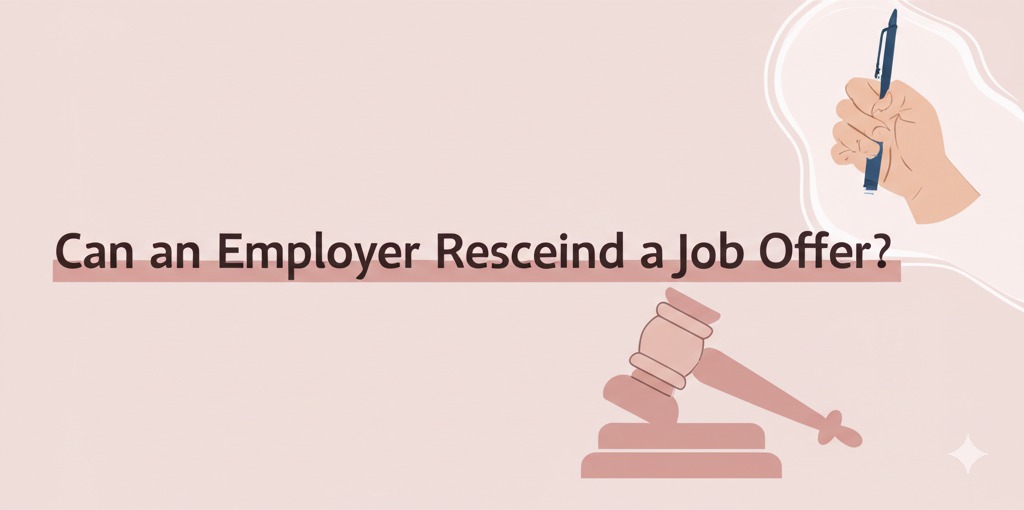
Receiving a job offer is a moment of celebration, but what if it’s suddenly taken back? Can an employer legally rescind a job offer? This situation is more common than you might think and can leave job seekers confused, frustrated, and uncertain about their rights. In this article, we’ll explore the key aspects of whether an employer can rescind a job offer, what to do if it happens, and how to protect yourself.
What Does It Mean for an Employer to Rescind a Job Offer?
A job offer rescinded is simply when an employer decides to withdraw an offer of employment after it’s been extended to a candidate. This could happen at any point after the offer is made but before the employee starts the role. While it’s often seen as a setback, understanding the legal aspects of rescinding a job offer can help you navigate the situation more effectively.
Can an Employer Legally Rescind a Job Offer?
At-Will Employment
In many cases, the ability for an employer to rescind a job offer comes down to the employment laws in your region and whether you’re working under an “at-will” employment agreement. In the United States, most states follow the at-will employment doctrine, meaning that either party (employer or employee) can end the employment relationship at any time without notice or cause.
This also applies to job offers. If the job offer was not formalized with a signed contract, an employer may have the right to rescind the offer before you’ve officially started working. However, there are some exceptions to this.
Exceptions to At-Will Employment
Although at-will employment gives employers a broad scope, certain situations may limit their ability to rescind a job offer:
- Discrimination: Employers cannot rescind a job offer based on discrimination related to race, gender, religion, age, disability, or other protected classes under federal or state law.
- Breach of Contract: If the job offer was made as part of a binding contract (such as in the case of an executive-level position or certain high-skilled roles), the employer may be legally bound to honor the offer.
- False Statements: If the employer rescinds the offer due to misleading or false information they received about your qualifications or background, you might have legal recourse.
Common Reasons Why an Employer Might Rescind a Job Offer
1. Failed Background Checks
Employers often conduct background checks before finalizing an offer. If discrepancies or red flags appear during the background check (such as criminal history, discrepancies in qualifications, or negative references), they may rescind the job offer.
2. Changes in Business Needs
Sometimes, employers may experience unexpected changes in business conditions that cause them to reevaluate staffing needs. This could include economic downturns, mergers, or a shift in the company’s priorities.
3. Failure to Meet Conditions
Many job offers are contingent on certain requirements, such as passing a drug test or providing documentation. If you fail to meet these conditions, the employer may have grounds to rescind the offer.
4. A Better Candidate
Occasionally, employers may decide that another candidate is more suitable for the position after the offer is extended. While this can feel disappointing, it is within the employer’s rights, provided no discrimination occurred.
What to Do If Your Job Offer is Rescinded
1. Review the Offer and Communication
Before taking any steps, review the offer letter and any communication from the employer. Look for any contingencies mentioned in the offer, such as background checks or drug tests. If the offer was contingent on a condition you failed to meet, the employer’s decision may be justified.
2. Contact the Employer
If the reason for the rescinded offer is unclear, or if you believe the decision was made unfairly, consider contacting the employer for clarification. Ask for a detailed explanation of why the offer was rescinded and whether there’s any chance for reconsideration.
3. Consider Legal Action
If you suspect that the offer was rescinded due to discrimination or breach of contract, it may be worthwhile to consult a lawyer. Legal action could involve filing a discrimination claim or taking steps to enforce a contract if one was in place.
4. Move On and Stay Positive
Although a rescinded job offer is frustrating, it’s important to remember that other opportunities will arise. Refocus on your job search, update your resume, and continue networking.
Preventing a Rescinded Job Offer: Tips for Job Seekers
1. Be Transparent and Honest
From the beginning of the hiring process, be honest about your qualifications, work history, and personal details. Misrepresentation can lead to the offer being rescinded once an employer uncovers inconsistencies.
2. Meet the Contingency Requirements
If your job offer is contingent on background checks, drug testing, or providing additional documentation, make sure you fulfill these requirements promptly. Delays or failures to comply may jeopardize your job offer.
3. Have a Signed Contract
Whenever possible, ensure that your job offer includes a formal, signed contract. This provides additional security and can prevent the employer from easily rescinding the offer without valid cause.
4. Keep Communication Open
Throughout the hiring process, maintain clear and professional communication with your potential employer. This helps build a positive relationship and minimizes misunderstandings that might lead to a rescinded offer.
Conclusion: Can an Employer Rescind a Job Offer?
Yes, an employer can rescind a job offer, especially if the offer was not part of a binding contract or if the reason falls under legal exceptions. It’s important to understand your rights and what may lead to a job offer being withdrawn. If it happens to you, take the necessary steps to assess the situation, communicate with the employer, and take legal action if needed. Always remember, a job offer rescinded doesn’t mean the end of your career journey. Stay positive and keep pushing forward in your job search.

Andre Cuevas provides career insights, job search strategies, and professional advice to help individuals navigate the job market and achieve their career goals.





